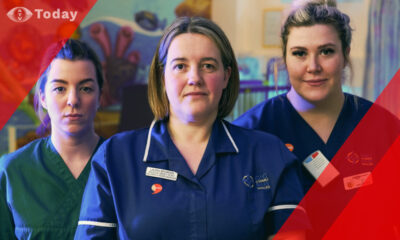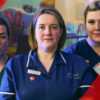A documentary tonight looks at the concerns with journalist Maxine Hughes…
The number of teenage boys in Wales who are being radicalised by neo-Nazi groups is growing faster than in any other part of the United Kingdom – and it’s time for Welsh-speakers to recognise that it’s happening right under our noses, says a lecturer from Cardiff University.
In Byd Eithafol: Neo-Nazis yn ein Plith, journalist Maxine Hughes lifts the curtain on the far-right groups that thrive online and the vulnerable people they target. Through interviews with those all sides of the debate – politicians, teachers, current and former far-right activists, protesters against the camp for refugees in Penally, young gamers and their parents – a shocking picture emerges of the extent of the problem in Wales.
Statistically, white boys under 20 years of age in rural areas are most likely to be absorbed into the extreme right-wing culture, by self-radicalising online.
This leads Maxine to explore how easy it is to connect with suspicious people in online games, and to talk to the mother of one boy who was radicalised. “My son was like any 14-year-old boy. He was happy, fun, kind, caring and loving,” she said. “By the end, we had no relationship at all.”
Maxine comes to understand that far-right groups are targeting neurodiverse young people especially – and why. “Sometimes autistic people will seek out sensory experiences because they don’t get that feedback naturally from their own sensory systems,” explains Dr. Donna Sharland, a Neurodiversity Specialist Consultant with Counter Terrorism Policing Wales.
“So things like visual symbols can be very attractive; flags have always been very attractive to autistic people. So you can understand that when far-right groups use those symbols it can attract [neurodivergent people]. It’s very worrying.”
The Welsh are naive about the threat of neo-Nazism, argues Dr Huw Williams, philosophy lecturer who has studied the growth of the extreme right-wing movement in Wales. “It’s more or less on our doorstep. We know that these ideas, these attitudes, these groups, are alive and well to a large extent,” he said.
“It is very interesting to look during the Eisteddfod week, where many people said on social media how good it was to see the Welsh coming together to celebrate their culture, but that suggests that these groups are not lurking in the shadows. That is problematic. We have to be realistic about the fact that these ideas are of course taking root and have been there for many years.”
The programme will be shown on S4C on Monday 31 March at 8 pm and will also be available on S4C Clic and BBC iPlayer.











